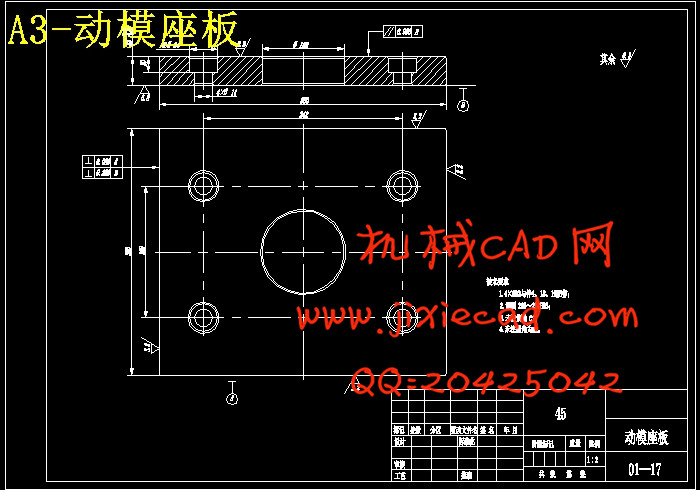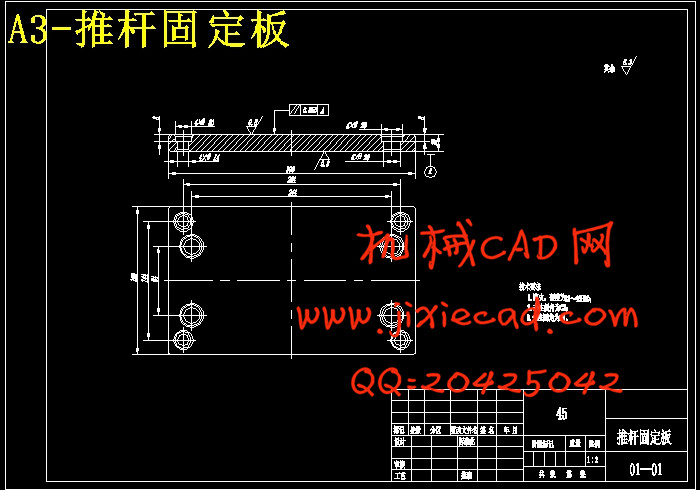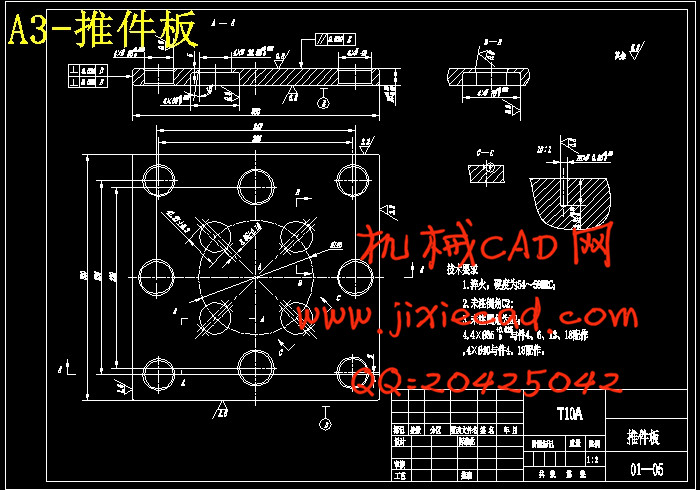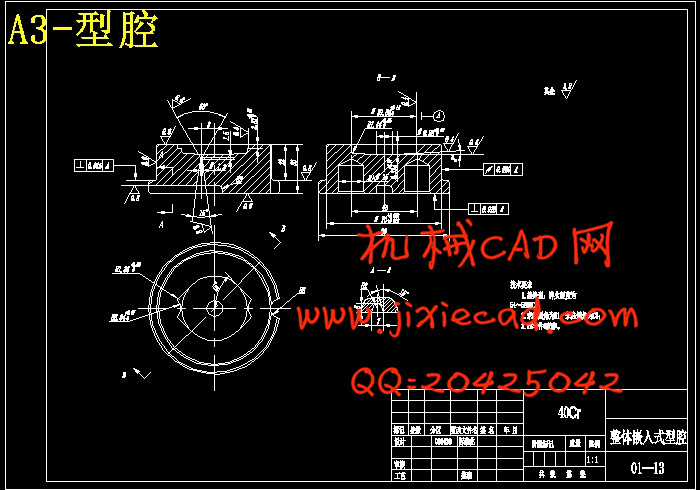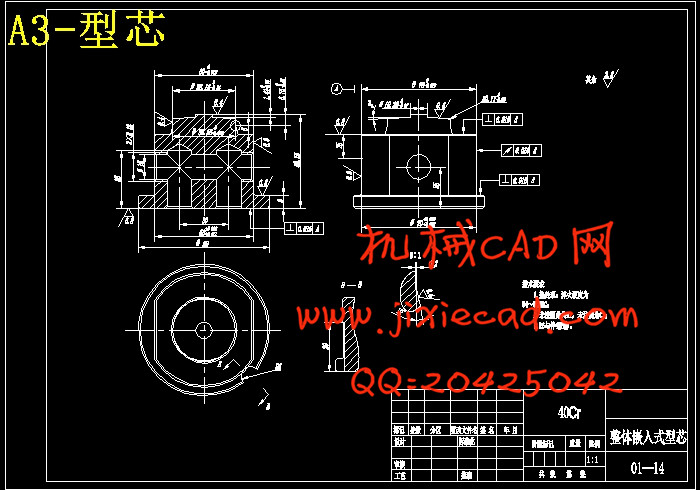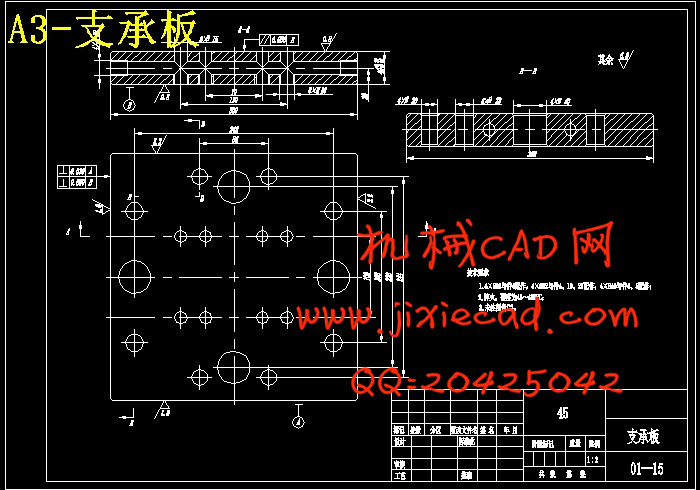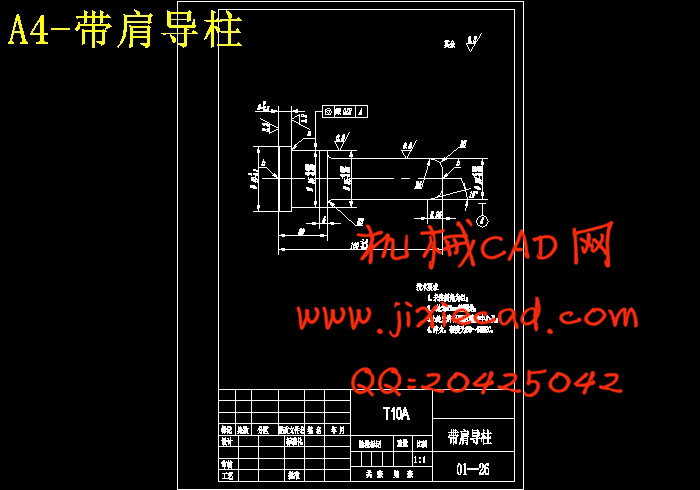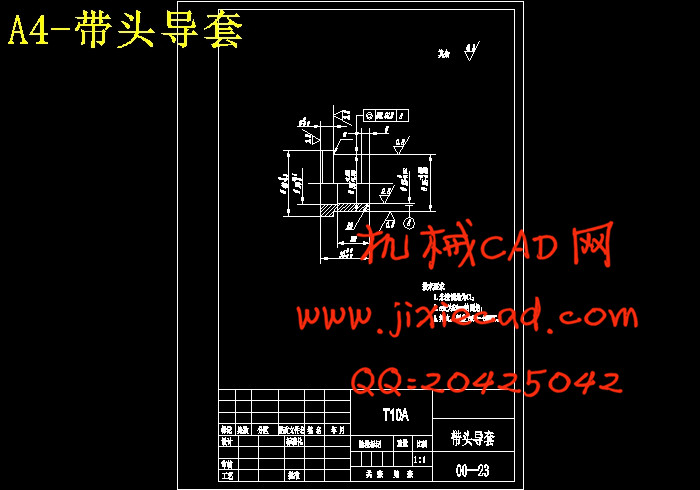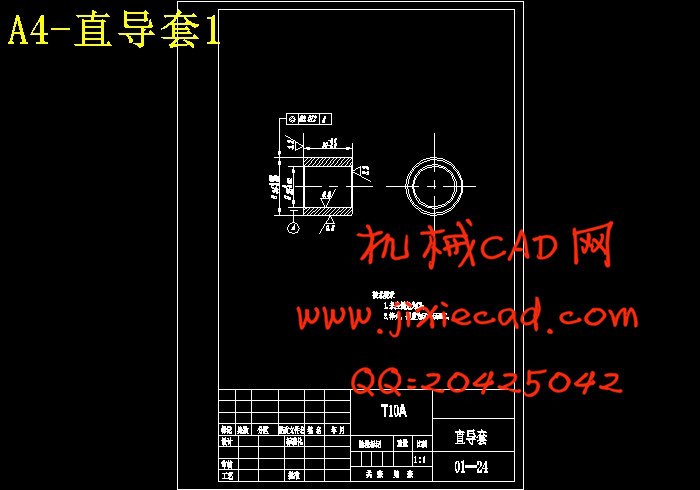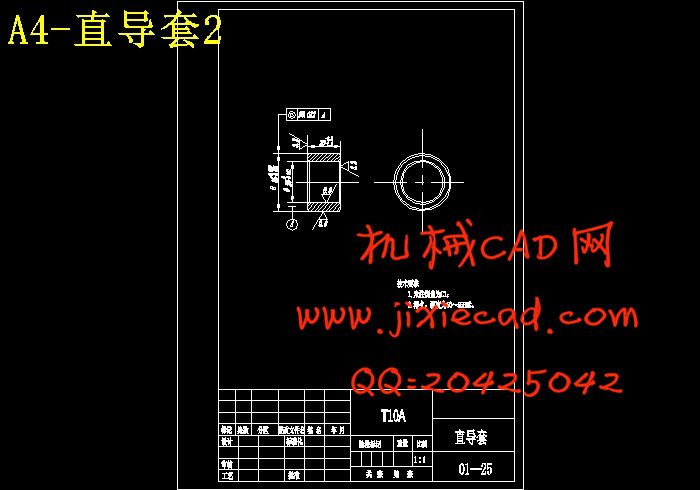设计简介
防尘罩塑料成型工艺与模具设计
摘要
本设计题目为防尘罩塑料成型工艺与模具设计,体现了小型薄壁零件的设计要求、内容及方向,有一定的设计意义。通过对该零件模具的设计,进一步加强了设计者注塑模设计的基础知识,为设计更复杂的模具做好了铺垫和吸取了更深刻的经验。
本设计运用塑料成型工艺及模具设计的基础知识,首先分析了塑件的成型工艺,为选取浇口的类型做好了准备;然后计算了塑件的体积,查取所用塑料的成型工艺参数,便于选取注塑机及确定型腔数量;最后分析了塑件的特征,确定模具的设计参数、设计要点及推出装置的选取。
本塑件的形状大致为圆形,所以在设计成型零部件的结构时将型腔和型芯都都设计成了整体嵌入式,这样各个型腔的形状和尺寸一致性高,而且能节约优质模具钢,嵌入模板后有足够强度与刚度,使用可靠且更换方便。在本副模具的设计中,由于塑件为薄壁透明件,推出机构设计为推板推出机构。为防止过度磨损和咬合发生,推板孔与型芯应作淬火处理,并在推板与型芯间留有单边0.2mm间距,避免两者之间接触,并有锥形配合面起辅助定位作用,可防止推板孔偏心而引起溢料,取锥度为10°。在分型设计时首先靠弹簧的弹力,在第一分型面处分型,然后靠定距拉杆在第二分型面处分型,并拉断浇口凝料。这样能降低劳动强度,提高生产率。
关键词:注塑模 浇口 分型面 型腔 型芯 推板
The plastic molding process and mold design
of the dust prevention cover
Abstract
The requirement ,content and direction of the design of the thin wall plastic parts are embodied on this injection mould design of the plastic parts of the dust prevention cover.The designer’s foundation knowledge of the injection mould design is reinforced and is able to design more complex injection mould through the design.
Through the foundation knowledge, firstly, the moulding technology of thr part is analyzed to choose the type of the gat advantagely. Secondly, the volume of the part is estimated to choose the injection molding machine and to detemine the mould quantity conveniencely. Lastly the character of the part is analyzed to determine the mould design parameter and design point and choose the ejection assembly.
To this injection mold design, two parting surface and pin point are applide. As designed,the injection mould of the plastic parts of the dust prevention cover is multi-impression mould.As a matter of course,insert cavity and core are used.Because the wall of the plastic parts of the dust prevention cover is very thin,the stripper plate ejection is used in the ejector system ,which utilize the ejector plate.
Keywords: Injection mould , gate,parting surface,cavity,core,ejector plate.
目 录
1 绪论……………………………………………………………………………1
1.1 国内塑料模具行业的现状和主要问题…………………………………1
1.1.1国内塑料模具行业的现状………………………………………………1
1.1.2国内塑料模具行业的主要问题…………………………………………2
1.2 我国注塑模具的发展前景………………………………………………2
2 防尘罩塑料制件的注塑工艺分析……………………………………………5
2.1 防尘罩塑料制件的成型工艺性分析……………………………………5
2.2 成型设备的选择与注射成型工艺规程的编制…………………………7
2.2.1计算塑料制件的体积和质量……………………………………………7
2.2.2确定注射成型工艺参数…………………………………………………7
2.2.3编写注射成型工艺卡……………………………………………………8
3 注射模的结构设计……………………………………………………………10
3.1 分型面的选择……………………………………………………………10
3.2 确定型腔数目及型腔布置方式…………………………………………11
3.1 设计浇注系统……………………………………………………………12
3.3.1主流道的设计……………………………………………………………12
3.3.2分流道的设计……………………………………………………………13
3.3.3浇口位置的确定…………………………………………………………15
3.3.4设计浇口…………………………………………………………………15
3.3.5确定点浇口数量及位置…………………………………………………17
3.4 型芯型腔结构设计………………………………………………………22
3.4.1型芯结构设计……………………………………………………………22
3.4.2型腔结构设计……………………………………………………………22
4 注射机参数的校核……………………………………………………………24
4.1 型腔数目的校核…………………………………………………………24
4.2 最大注射量的校核………………………………………………………24
4.3 锁模力的校核……………………………………………………………25
4.4 注射压力的校核…………………………………………………………25
4.5 双分型面注射模开模行程的校核………………………………………25
4.6 模具在注射机上安装与固定尺寸的校核………………………………25
5 推出机构的设计………………………………………………………………27
6 冷却系统的计算和校核………………………………………………………28
7 型腔型芯冷却回路的设计……………………………………………………30
8 确定排气方式…………………………………………………………………31
9 成型零件工作尺寸的计算……………………………………………………32
10 选择模架………………………………………………………………………34
11 绘制模具总装配图并简述工作原理…………………………………………35
12 主要零件加工工艺规程的编制………………………………………………36
13设计总结…………………………………………………………………39
致谢…………………………………………………………………………………40
参考文献……………………………………………………………………………41
摘要
本设计题目为防尘罩塑料成型工艺与模具设计,体现了小型薄壁零件的设计要求、内容及方向,有一定的设计意义。通过对该零件模具的设计,进一步加强了设计者注塑模设计的基础知识,为设计更复杂的模具做好了铺垫和吸取了更深刻的经验。
本设计运用塑料成型工艺及模具设计的基础知识,首先分析了塑件的成型工艺,为选取浇口的类型做好了准备;然后计算了塑件的体积,查取所用塑料的成型工艺参数,便于选取注塑机及确定型腔数量;最后分析了塑件的特征,确定模具的设计参数、设计要点及推出装置的选取。
本塑件的形状大致为圆形,所以在设计成型零部件的结构时将型腔和型芯都都设计成了整体嵌入式,这样各个型腔的形状和尺寸一致性高,而且能节约优质模具钢,嵌入模板后有足够强度与刚度,使用可靠且更换方便。在本副模具的设计中,由于塑件为薄壁透明件,推出机构设计为推板推出机构。为防止过度磨损和咬合发生,推板孔与型芯应作淬火处理,并在推板与型芯间留有单边0.2mm间距,避免两者之间接触,并有锥形配合面起辅助定位作用,可防止推板孔偏心而引起溢料,取锥度为10°。在分型设计时首先靠弹簧的弹力,在第一分型面处分型,然后靠定距拉杆在第二分型面处分型,并拉断浇口凝料。这样能降低劳动强度,提高生产率。
关键词:注塑模 浇口 分型面 型腔 型芯 推板
The plastic molding process and mold design
of the dust prevention cover
Abstract
The requirement ,content and direction of the design of the thin wall plastic parts are embodied on this injection mould design of the plastic parts of the dust prevention cover.The designer’s foundation knowledge of the injection mould design is reinforced and is able to design more complex injection mould through the design.
Through the foundation knowledge, firstly, the moulding technology of thr part is analyzed to choose the type of the gat advantagely. Secondly, the volume of the part is estimated to choose the injection molding machine and to detemine the mould quantity conveniencely. Lastly the character of the part is analyzed to determine the mould design parameter and design point and choose the ejection assembly.
To this injection mold design, two parting surface and pin point are applide. As designed,the injection mould of the plastic parts of the dust prevention cover is multi-impression mould.As a matter of course,insert cavity and core are used.Because the wall of the plastic parts of the dust prevention cover is very thin,the stripper plate ejection is used in the ejector system ,which utilize the ejector plate.
Keywords: Injection mould , gate,parting surface,cavity,core,ejector plate.
目 录
1 绪论……………………………………………………………………………1
1.1 国内塑料模具行业的现状和主要问题…………………………………1
1.1.1国内塑料模具行业的现状………………………………………………1
1.1.2国内塑料模具行业的主要问题…………………………………………2
1.2 我国注塑模具的发展前景………………………………………………2
2 防尘罩塑料制件的注塑工艺分析……………………………………………5
2.1 防尘罩塑料制件的成型工艺性分析……………………………………5
2.2 成型设备的选择与注射成型工艺规程的编制…………………………7
2.2.1计算塑料制件的体积和质量……………………………………………7
2.2.2确定注射成型工艺参数…………………………………………………7
2.2.3编写注射成型工艺卡……………………………………………………8
3 注射模的结构设计……………………………………………………………10
3.1 分型面的选择……………………………………………………………10
3.2 确定型腔数目及型腔布置方式…………………………………………11
3.1 设计浇注系统……………………………………………………………12
3.3.1主流道的设计……………………………………………………………12
3.3.2分流道的设计……………………………………………………………13
3.3.3浇口位置的确定…………………………………………………………15
3.3.4设计浇口…………………………………………………………………15
3.3.5确定点浇口数量及位置…………………………………………………17
3.4 型芯型腔结构设计………………………………………………………22
3.4.1型芯结构设计……………………………………………………………22
3.4.2型腔结构设计……………………………………………………………22
4 注射机参数的校核……………………………………………………………24
4.1 型腔数目的校核…………………………………………………………24
4.2 最大注射量的校核………………………………………………………24
4.3 锁模力的校核……………………………………………………………25
4.4 注射压力的校核…………………………………………………………25
4.5 双分型面注射模开模行程的校核………………………………………25
4.6 模具在注射机上安装与固定尺寸的校核………………………………25
5 推出机构的设计………………………………………………………………27
6 冷却系统的计算和校核………………………………………………………28
7 型腔型芯冷却回路的设计……………………………………………………30
8 确定排气方式…………………………………………………………………31
9 成型零件工作尺寸的计算……………………………………………………32
10 选择模架………………………………………………………………………34
11 绘制模具总装配图并简述工作原理…………………………………………35
12 主要零件加工工艺规程的编制………………………………………………36
13设计总结…………………………………………………………………39
致谢…………………………………………………………………………………40
参考文献……………………………………………………………………………41








